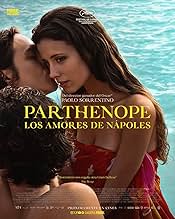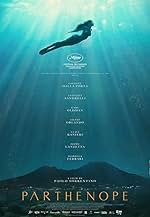अपनी भाषा में प्लॉट जोड़ेंA woman born in the sea of Naples in 1950 searches for happiness over the long summers of her youth, falling in love with her home city and its many memorable characters.A woman born in the sea of Naples in 1950 searches for happiness over the long summers of her youth, falling in love with her home city and its many memorable characters.A woman born in the sea of Naples in 1950 searches for happiness over the long summers of her youth, falling in love with her home city and its many memorable characters.
- पुरस्कार
- 7 जीत और कुल 25 नामांकन
- Raimondo 10 anni
- (as Antonino Annina)
- Vecchia megera
- (as Mariarosaria Bozzon)
सारांश
फ़ीचर्ड समीक्षाएं
"She's always fleeing," says her brother Raimondo, because Youth is a substance that constantly slips through our fingers like sand.
I think there is also an obvious parallel with Aphrodite, who was born from sea foam: Parthenope was born in the water of the Mediterranean Sea.
But nice metaphors, analogies and beautiful cinematography are not enough to touch my soul. For me, this film is only a faint shadow of La grande bellezza. I couldn't help but compare the two films and think that Sorrentino put much more soul into La grande bellezza, because he understands men, but not so much women.
What also disappointed me in this film was the acting of Celeste Dalla Porta and Dario Aita: it's not my cup of tea at all, I found their performance very forced. Although I enjoyed the acting of Luisa Ranieri and Gary Oldman.
Overall, it definitely won't be my favorite Sorrentino film.
Not its beauty, but the Napoli itself is one of the key topics. If this city could be personified, it will definitely be a beautiful woman. Only, just like a person, Napoli is much more than a beauty and it definitely has its dark places.
It personally touched me that one of the key topics (and a key question) is also (what is) a study of Anthropology. Anthropology, formed of two Latin words, meaning a person and science. No other study could have been better for this movie, rather than a study of the most complicated being in this world. I will save you from spoilers and let you think of what Anthropology is before the movie answers it for you, but keep in mind that it is shown by the biggest "superpowers" of Parthenope and especially in her brother Raimondo, who in my opinion was the one that taught that to Parthenope.
The third matter that made me absolutely passionate about this movie was the precise choice of words and creation of dialogues. Her love interests were mostly people who had the most beautiful way of expressing their emotions. Listing to their dialogues made me feel like I've read a book.
I highly recommend watching this movie, although it may have some bizarre moments that can make you feel uneasy. But if you are open to understanding and accepting the strangeness, it will definitely let you "get carried away."
The mesmerizing performance by debut actress Celeste Dalla Porta is the heart and soul of Parthenope. Her enigmatic portrayal of the titular character is a masterclass in subtlety and allure, drawing the audience into her journey of self-realization. The partnership between Sorrentino and cinematographer Daria D'Antonio is once again a match made in heaven, as they paint a vivid picture of Italy's stunning landscapes.
Sorrentino's signature style is on full display in Parthenope, with the film's episodic structure allowing for a deep dive into the protagonist's experiences. While some may argue that the film prioritizes style over substance, it's hard to deny the sheer visual splendor and emotional resonance that Sorrentino achieves.
Parthenope is a celebration of youth, beauty, and the transformative power of self-discovery. It's a testament to Sorrentino's unique vision and unwavering commitment to his craft. While it may not be a radical departure from his previous works, Parthenope is a stunning addition to his filmography and a must-see for fans of his distinct cinematic style.
- Eça de Queirós, The Illustrious House of Ramires, mutatis mutandis.
"The most beautiful gift is not the most expensive; it is the most fragile." Marques Rebelo, O Trapicheiro.
As the lights of the nineteenth century faded, Eça de Queirós-the great Eça-painted, through the face of Gonçalo Mendes Ramires, a symbolic portrait of Portugal that, as any good symbol does, contained everything, even when it sometimes seemed to contain nothing at all. Last year, Paolo Sorrentino, the great artist of contemporary cinema, painted with the face and body of Parthenope the symbolic portrait of Naples: yet another of his masterpieces, unveiling a city and a woman that, in the blink of an eye, are one in the lyrical conception of poet Sorrentino. Naples, or Parthenope- a name that evokes the mythological siren whose body is said to have given birth to the city-is not merely a backdrop, but a pulsating character. And Parthenope, the protagonist (portrayed with an ethereal melancholy), is its incarnation: born in the waters of the Mediterranean, like Venus, like Naples, she carries within her the contradiction of the sublime and the grotesque, of desire and death.
Sorrentino, heir to a Fellini-esque sensitivity for both beauty and the bizarre, does not fear excess. In scenes such as the party in Capri-where beautiful faces and bodies dissolved under golden lights-Parthenope, in her melancholy, asks her millionaire admirer: "Lei non pensa che il desiderio sia un mistero e il sesso il suo funerale?" [don't you think that desire is a mystery and sex its funeral]. The phrase echoes like an epitaph, laid bare to reveal the fragility and preciousness of desire and youth: desire as an unfathomable mystery, and sex as the funeral ritual of something that will never be consummated. It is in this interplay of opposites that the narrative unfolds, between the sculptural beauty of Naples' landscapes and the harshness of its forgotten alleys, where the protagonist walks with Roberto, an ambiguous character who unveils to her the other side of the city-a Naples both raw and poetic, where the contrast between the opulent luxury of grand houses and the simplicity of neglected corners becomes a metaphor for the city's inherent duality. Every step, every exchanged glance, carries the tension between the ephemeral and the eternal, between the urgent and the trivial. There, in the interplay of shadow and light, "the irrelevant merges with the decisive," as if chance itself became the silent arbiter of destinies. But is there any sense in speaking of chance? In song, Riccardo Cocciante tells us otherwise-everything was already foreseen.
"Beauty is like war: it opens doors," declares the alcoholic writer John Cheever (portrayed by Gary Oldman) in his brief, ghostly appearance. Drunkenly, he murmurs about the "scent of dead loves," a fragrance he claims to detect in his hotel room, surrounded by bottles of alcohol. So many dead loves in the city, in Parthenope's life. Here, her beauty is a weapon-a weapon that invariably wounds those who wield it: capable of granting access to privileged worlds, yet also imprisoning one in gilded cages. But Parthenope is a woman-city that "sfugge sempre": she flees, escapes, refuses to be deciphered, and always has a retort ready to disarm her interlocutors. What mysteries lie hidden within her?
The narrative delves into a universe where every image is meticulously sculpted to reveal the mysteries of existence. Amid this tapestry of contrasts stands Cardinal Tesorone, with his imposing and perverse figure, his grotesque nature and skepticism-a link in a Neapolitan religiosity divided between the sacred and the profane. His discourse, laden with solemnity and irony, resonates in the scene where, clad only in the adornments of San Gennaro's treasure, he attempts to seduce the city of Parthenope-or perhaps merely the delectable Parthenope herself-with the lubricity of a faun and the cynicism of an old man. Il tempo che scorre insieme al dolore.
In every dialogue, in every exchanged glance, the question echoes: is it possible that by trying to master desire, love ultimately imprisons its own freedom? And in this eternal ebb and flow between wanting and being, the protagonist remains undefinable, always escaping, constantly reinventing herself-as if the very city of Naples refused to be confined by labels or predetermined destinies.
In the twilight of her existence-be it amidst the effervescence of a Capri celebration or in the solitude of a dim alley-Parthenope presents herself as the synthesis of all the opposites that coexist in Naples: the sublime and the grotesque, desire and death, fragility and strength. It is this paradoxical combination that renders her portrait so unforgettable-a mirror, perhaps, of a city whose soul, despite everything, continues to pulse with an indomitable vitality, defying time and destiny with an irony that, in the end, remains its sole certainty.
The overall problem...There is no plot, it's more a series of separate scenes on narcissism, or rather that's how they come across. I think Sorrentino wanted to create something profound but the result feels contrived and sad.
And then there's the anticlimactic ending - a sudden flash forward 50 years to an oddly empty/vacant character that is Parthenope in her 70s. What? Why?
क्या आपको पता है
- ट्रिवियाPaolo Sorrentino said he reached out to Gary Oldman about filming a cameo after hearing that Oldman was a huge fan of his. Oldman immediately accepted saying Sorrentino was at the top of his wish list to collaborate with.
- भाव
Devoto Marotta: It's very difficult to see, because it's the last thing you learn.
Parthenope: When do you learn to see?
Devoto Marotta: When everything else begins to be missing.
Parthenope: What is everything else?
Devoto Marotta: Love, youth, desire, emotion, pleasure.
- साउंडट्रैकWarmth
Written by Peter Gregson
Performed by Peter Gregson, Warren Zielinski, Magdalena Filipczak, Laurie Anderson, Ashok Klouda
टॉप पसंद
Everything New on HBO Max in June
Everything New on HBO Max in June
- How long is Parthenope?Alexa द्वारा संचालित
विवरण
- रिलीज़ की तारीख़
- कंट्री ऑफ़ ओरिजिन
- आधिकारिक साइटें
- भाषाएं
- इस रूप में भी जाना जाता है
- Партенопа
- फ़िल्माने की जगहें
- उत्पादन कंपनियां
- IMDbPro पर और कंपनी क्रेडिट देखें
बॉक्स ऑफ़िस
- बजट
- €2,63,00,000(अनुमानित)
- US और कनाडा में सकल
- $2,89,303
- US और कनाडा में पहले सप्ताह में कुल कमाई
- $31,588
- 9 फ़र॰ 2025
- दुनिया भर में सकल
- $1,16,51,125
- चलने की अवधि2 घंटे 17 मिनट
- रंग
- ध्वनि मिश्रण
- पक्ष अनुपात
- 2.39 : 1
इस पेज में योगदान दें































